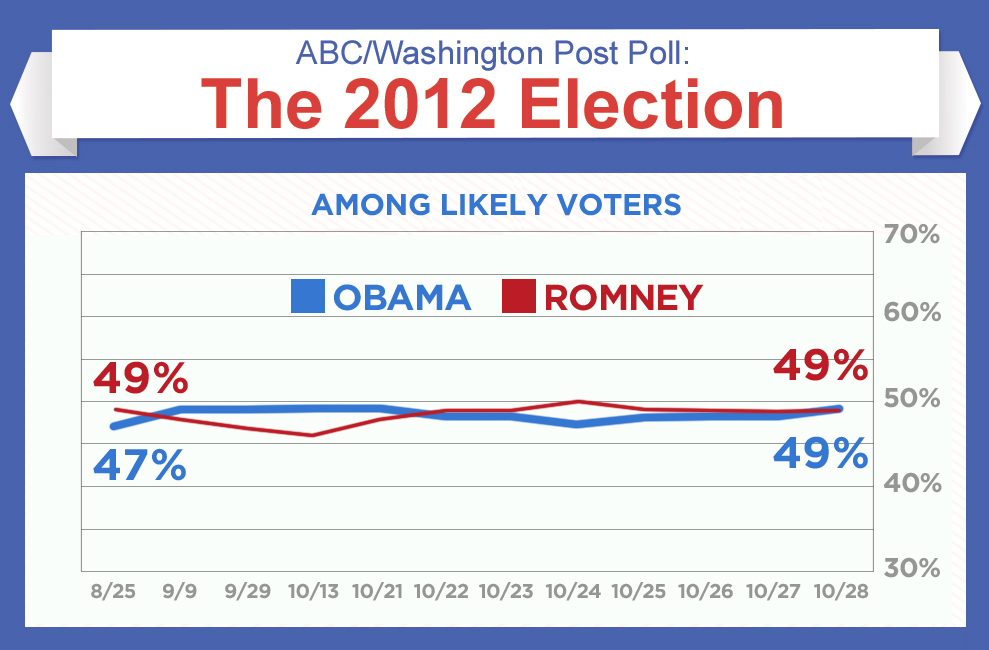Edge on the Middle Class Helps Obama Counterpunch

Sara D. Davis/Getty Images
With the election a week away Mitt Romney faces persistent skepticism about his commitment to the middle class, a vulnerability for the Republican challenger that's keeping the race locked tight - a precise dead heat in the latest ABC News/Washington Post tracking poll, 49-49 percent.
Barack Obama, for his part, inched to a bare majority in job approval in the latest four-night survey, benefitting from a gradual improvement in economic attitudes - still weak, but trending up. Notably, it's his first time over 50 percent approval among likely voters in ABC/Post polls since July, just in time to counter what had been underlying momentum for Romney last week.
See PDF with full results and charts here.
In one of Obama's key assets, a broad 66 percent of likely voters continue to say he does more to favor the middle class than the wealthy, a measure that's held steady even as Romney gained on a range of other attitudes. Just 14 percent in this poll, produced for ABC by Langer Research Associates, think Obama favors the wealthy.
Romney continues to struggle on the same question: Just 34 percent think that, as president, he'd favor the middle class; virtually the same as it's been in ABC/Post polls since midsummer. Fifty-three percent think he'd favor the wealthy - enough for trouble.
Among people who don't think Romney would favor the wealthy, nearly all support him - by a vast 92-6 percent. But among the 53 percent who do think he'd do more for the wealthy than the middle class, that flips to nearly as broad a margin in Obama's favor, 87-10 percent.

ABC News
BETTER? - Romney's response on the middle class has been to underscore the shortfall in prosperity that's made Obama vulnerable in the first place. Just 22 percent in this poll say they've gotten better off under his presidency, vs. 33 percent worse off. The rest say they're in about the same shape financially as when Obama took office.
But the trend in these sentiments also is keeping Obama in the game. The "better off" number has advanced from a mere 8 percent among all Americans in July 2009 and from 13 percent a year ago. The "worse off" number, in the past year, has been essentially unchanged.
Obama, naturally, has a huge lead among "better off" likely voters, 82-17 percent, as does Romney among the larger number who say they're worse off, 89-10 percent. (It's worth noting that political predispositions color these financial self-assessments.) The tougher battle for Romney is among people who say they're in the same shape financially as when Obama took office; they currently split in Obama's favor, 61-35 percent.
These dynamics appear to have helped Obama stem Romney's advance on other basic economic views after the final debate last week. Through September and mid-October the two were in a virtual dead heat in trust to handle the economy. By the middle of last week Romney'd taken a 9-point lead on this key question. But it's reverted since - now Romney +2, essentially tied again.
On economic empathy, similarly, Obama is back to a marginal advantage, 50-44 percent vs. Romney in "understanding the economic problems people in this country are having." That, too, had tightened last week, to a non-significant +2 for Obama, the closest of the campaign.
The give-and-take on these measures illustrate the reasons the race is so close: Discontent with the economy, but somewhat less pessimism about its impacts; soft approval ratings for the president, yet still at the halfway mark; and mixed views on who's better suited both to handle the economy, and to understand the damage it's done to average Americans.
CONTACT and GROUPS - If it stays this close, a dead-even race is one that's decided by turnout, and there the ground games come into play. The latest data show Romney still keeping pace with Obama in voter contacts overall - but Obama moving back to an edge in efficiency, that is, in contacting people who actually support him, in order to encourage their turnout.
Nationally, 26 percent of likely voters say they've personally been contacted by a representative of Obama's campaign, 24 percent by Romney's. In the 10 states designated as battlegrounds by the ABC News Political Unit, more, 45 percent, report being contacted by Obama, 39 percent by Romney.
In efficiency, Obama has regained a lead, especially in the battleground states. There, among those contacted by the Obama campaign, 66 percent say they're in fact Obama supporters. Among those contacted by Romney's campaign, fewer support him, 51 percent.
Trends among groups, meanwhile, show continued remarkable polarization. Ninety-one percent of Democrats support Obama, at the high end for the party's past presidential candidates. Romney, for his part, is at 94 percent among Republicans, a new high of the campaign.
Independents are customarily a more changeable group, as they're less anchored by partisanship. They now divide 53-43 percent in Romney's favor. Independents are a more GOP-leaning group now than in 2008; how far they lean could make the difference next week.
METHODOLOGY - This ABC News/Washington Post poll was conducted by telephone Oct. 25-28, 2012, among a random national sample of 1,259 likely voters, including landline and cell-phone-only respondents. Results have a margin of sampling error of 3.5 points, including design effect. The survey was produced for ABC News by Langer Research Associates of New York, N.Y., with sampling, data collection and tabulation by Abt-SRBI of New York, N.Y.
Partisan divisions in this survey, Democrats-Republicans-independents, are 35-28-34 percent among likely voters. Partisan divisions in the 2008 exit poll were 39-32-29 percent. "Battleground states" as designated by the ABC News Political Unit are Colorado, Florida, Iowa, Nevada, New Hampshire, North Carolina, Ohio, Pennsylvania, Virginia and Wisconsin.